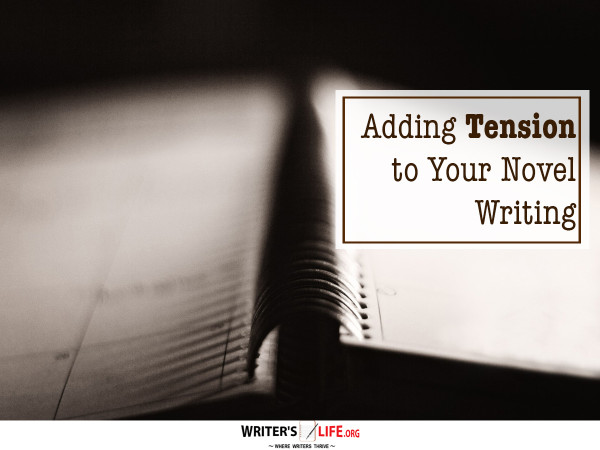Share, Pin or Retweet If You Love Writing!
I hope I don’t need to tell you why you need tension in your novel. Every story, regardless of genre, needs to ooze with tension.
Why? Because tension determines the pacing of the story.
Without tension of some sort, readers may lose interest. Their eyes might glaze over or their minds wander. They might start thinking about what to make for dinner or glance at all those bills sitting on the desk.
The last thing an author wants is for readers to think about anything other than the scene they’re reading.
To ensure readers stay riveted on a story, you need to ensure there is tension on every page.
Every page? Is that possible? Yes, it is.
The thing is, that you must also be riveted by the writing of your novel. Coming up with an intriguing narrative and adding tension to your writing takes time and many writers settle for less in their narrative because they have to rush their tone and the creation of their structure. The Writers Life creative team has put together a product called The Get It Done, Writer's Toolkit. This is an ebook/CD combo set that can teach you how to overcome writer's block and procrastination. You will learn how to stop stalling and start brainstorming money-making ideas for your blog.
But before we look at how that’s possible, we need to examine the types of tension at work here.
Different Types of Tension
Just what is tension, anyway?
In real life, we avoid tension, often at all costs. We don’t want to be tense, and we don’t like tense situations. And we don’t want others around us to be tense (although, some people are really into drama).
So let’s break this down a bit.
First, we need to look at two aspects of tension. There is the tension the characters feel as individuals, and then there is the overall tension in the story.
Don’t confuse action with tension. Don’t confuse high drama and high stakes with tension.
You can have the most exciting plot elements in the world—with car chase scenes and buildings blowing up and the threat of the end of the world and still completely lack any tension—as far as the reader is concerned.
So while you may be writing about tense things that should make people feel tense or you are showing characters under stress, that doesn’t necessarily equate to your book’s tension. The tension a writer should be aiming for is something other than making readers feeling uptight or worried.
Make Your Reader Tense
What we as writers want is tension in the reader. And that kind of tension is not dependent on what kind of action is going on in a story. Even the most subdued, quiet, nothing-seems-to-be-happening scene can have tension ramped to the max.
No, this doesn’t mean we want our readers to be stressed-out—although if you are writing intense suspense, that probably is exactly your aim. The kind of tension we want readers to feel is a sense of heightened anticipation, interest, curiosity, excitement.
This is a good kind of tension. Think of the tension in a tightrope. We want a reader’s attention to be taut.
In other words, we want readers to care so much about what is going on that they are uncomfortable. And when someone is uncomfortable, they want to resolve whatever it is to the point at which they can again feel comfortable.
The Secret to Tension
So what is the secret to creating that kind of tension in a novel? Great characters. Characters with a lot of inner conflict that is continually present.
Sure, outer conflict will add to that tension. But if your readers don’t care about what happens to your character—because you did not present and carefully showcase an empathetic, intriguing, vulnerable, engaging character—they won’t have much interest in the story and won’t feel that niggling need to know what happens next.
Let me just say this: without constant tension in your story, you won’t have a story.
If there are no stakes, no risks, nothing for your protagonist to lose, how can you have any tension? You can’t. And you can’t have a compelling story either.
So tension is story. Outer conflict throughout is crucial.
And the inner conflict your characters struggle with also creates tension. If your characters aren’t having problems making choices and don’t have conflicting feelings, your scenes will lack tension.
Keep in mind these important points about creating tension:
- Create great characters who struggle with inner and outer conflict.
- Have a terrific plot that features lots of outer conflict (which creates outward tension in the story).
- Make the stakes high—high for the protagonist and ones that impact her goal for the book. High stakes are about what the character cares passionately about. This is the key. To create tension, then, you need your very empathetic characters, and particularly your protagonist, to be facing trouble with high stakes.
If you spend time making sure your novel is full of great characters struggling with conflict, tightening your plot so it moves ahead at a steady clip, and raising the stakes for your characters as high as possible, you will succeed in making your readers tense. Which is a good thing.
If you are writing novels you might want to look at the Writer's Life online webinar called “How to Get Published, Sell Books & Attract Tens of Thousands of Readers by Selling Your Content on Amazon’s Kindle” CLICK HERE! It takes you through then entire process of creating a novel from devising the content, to scheduling writing to formatting, proof-reading and marketing.
This blog post by C.S. Lakin was posted with the title Why Every Novel Needs Tension (And How To Create It) at http://jenniferblanchard.net/guestpost-cs-lakin-tension/






















